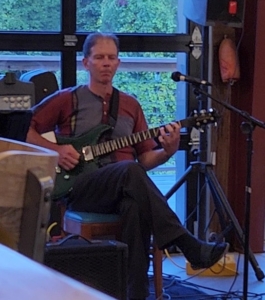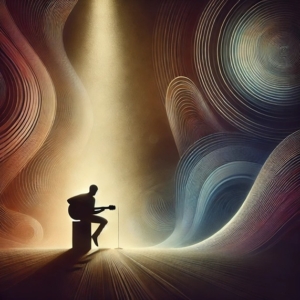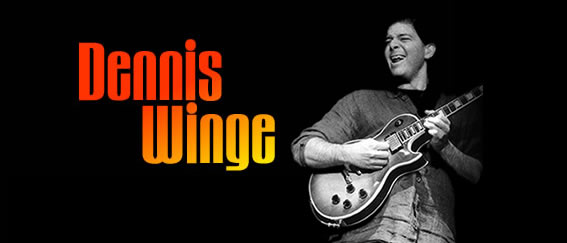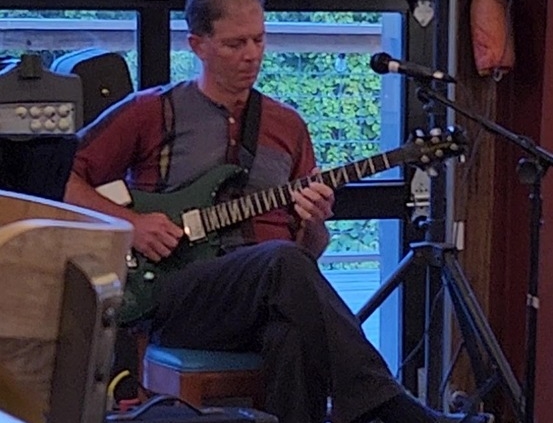Feeling Beat Up on Stage
/in Blog Posts/by denniswingeBeing a musician is a journey filled with highs and lows, triumphs, and challenges. Last night, I faced one of those challenging moments during an open mic session in Southport, NC. It was a night dedicated to instrumental Afro-Cuban Latin Jazz on solo guitar, a genre that I deeply enjoy but also presents unique difficulties. The experience left me feeling “beat up,” but also offered valuable lessons and reflections on the nature of performing, especially in less familiar environments.
The Challenge
Playing solo instrumental music, particularly in a genre as intricate as Afro-Cuban Latin Jazz, is significantly different from singing and playing. In vocal performances, the singer can connect with the audience through lyrics, facial expressions, and body language. In contrast, instrumental performances require a different kind of engagement. The focus is on the music itself, with no words to convey emotions or narratives. This makes it more challenging to captivate an audience, especially one not accustomed to purely instrumental music.
require a different kind of engagement. The focus is on the music itself, with no words to convey emotions or narratives. This makes it more challenging to captivate an audience, especially one not accustomed to purely instrumental music.
Afro-Cuban music, known for its complex rhythms and rich cultural heritage, is often performed by larger ensembles. These groups typically include multiple percussion instruments, horns, and sometimes vocalists, creating a vibrant and dynamic sound. Translating this experience into a solo guitar performance is no small feat. The genre’s rhythmic intricacies and the absence of other instruments meant that I had to carry the full weight of the performance on my own. The challenge was not only technical but also psychological, as I had to maintain the energy and engagement that a full band would typically provide.
In regions without a strong Latino presence, like where I was vacationing, this music might not resonate as deeply with the audience. People are generally more inclined to perceive instrumental music as an atmospheric backdrop to their conversation rather than actively engaging with it. That, coupled with my decision to play a genre that audiences were less familiar with, made it twice as hard to connect. Yet another element that made it difficult was the fact that several of my repertoire choices were originals in that genre.
The decision to perform Afro-Cuban pieces was rooted in my recent experiences. I’ve been heavily involved in this genre, playing with my band Sunset Salsa and on two gigs with the band Salsa Libre. These performances have allowed me to explore and appreciate the depth of Afro-Cuban music. However, translating that ensemble experience into a solo performance was a different challenge altogether. The absence of congas, horns, and other instruments meant that I had to work harder to convey the full texture of the music.
During the open mic, I felt the weight of these challenges. Unlike the other musicians who sang and played, I had to rely solely on my guitar to communicate. This meant intense concentration on my part, often looking down at the fretboard, which limited my ability to engage with the audience visually. The intricate rhythms and melodies of Afro-Cuban music added another layer of difficulty. It’s a genre not typically represented by solo guitar, as it usually involves larger ensembles with multiple horns, percussionists, singers, and more. Trying to encapsulate all that richness on a single guitar felt daunting.
Here is a short excerpt of the performance.
“Just the Living Room”
After my performance, the MC for the open mic asked the audience to give me another round of applause, clearly impressed by the performance. He then asked where in New York I usually played. At that moment, feeling a mix of exhaustion and vulnerability, I couldn’t bring myself to reveal that I am a professional musician who performs at weddings, parties, and corporate events. Instead, I simply said, “just the living room.” The MC, believing my story, later said, “you should play out more,” perhaps unaware of the depth of my musical journey and experience.
This interaction left me reflecting on the nature of vulnerability and authenticity in performance. Even seasoned musicians can feel overwhelmed by new challenges or unexpected circumstances. My decision to downplay my professional background wasn’t a conscious choice to deceive; rather, it was a moment of humility and introspection, recognizing the gap between my usual comfort zone and the challenging experience of that night.
Reflecting on the Experience
Despite the difficulties, the experience was ultimately rewarding. Successfully playing through the set, even under challenging conditions, was a personal victory. It reminded me of the importance of perseverance and the value of pushing oneself out of comfort zones. The audio recording of the  performance will serve as a valuable tool for self-critique and future practice, helping me refine my skills and approach.
performance will serve as a valuable tool for self-critique and future practice, helping me refine my skills and approach.
Moreover, this experience has deepened my appreciation for the genre and the craft of solo performance. It highlighted the complexities of Afro-Cuban music and the nuances required to perform it authentically on guitar. The challenges faced have also motivated me to continue exploring and mastering this genre, both in solo and ensemble settings.
The experience also reminds me that preparation is key; I did spend considerable time practicing and familiarizing myself with the pieces on solo guitar, and at least I was able to get through it somewhat competently. It also reminds me to practice positive self-talk and visualization, reminding myself of my capabilities and focusing on the joy of sharing music. These techniques helped mitigate the anxiety and allowed me to stay present during the performance, at least a bit more than I might have otherwise.
Embracing the Journey
Feeling “beat up” on stage is a common experience for musicians, whether due to technical difficulties, genre challenges, or performance anxiety. The feeling is the result of the mental and emotional toll of performance anxiety. Stage fright, even for seasoned performers, can be overwhelming. It stems from various sources: fear of judgment, lack of confidence, and the pressure to meet audience expectations.
However, these moments are also opportunities for growth and self-discovery. They test our resilience, enhance our skills, and remind us of the importance of preparation and mental fortitude.
As I continue my musical journey, I am grateful for these experiences. They remind me that every performance, no matter how challenging, is a chance to learn and grow. Whether playing for an audience familiar with the genre or introducing them to something new, the goal remains the same: to share the joy of music and connect with others. And sometimes, even in the toughest moments, that connection makes all the challenges worthwhile.
—



